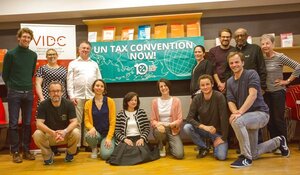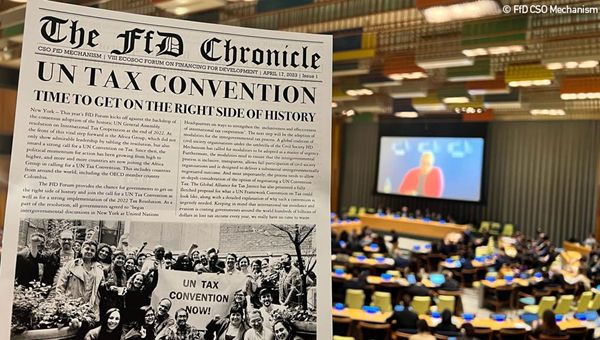From 14 to 16 May, the Tax Justice Network-Europe (TJ-E) held its bi-annual strategy meeting in Vienna, bringing together representatives of European civil society organizations working on tax justice. As part of a global coalition led by countries from the Global South, the Global Alliance for Tax Justice (GATJ) advocates for progressive and redistributive tax policies necessary to guarantee essential services and uphold human rights, as well as to address inequalities within and between nations. The discussions focused on several issues that are currently shaping the global tax landscape, highlighting issues such as wealth and environmental taxation and corporate tax transparency, but key conversations revolved around the United Nations Convention on International Tax Cooperation (UNFCITC) negotiations and the leading role of African member states in this process.
The UN process has been a major focus of GATJ's work for a long time, culminating in November 2023, when UN member states overwhelmingly adopted a resolution to establish a framework convention on tax. This was a landmark decision, as it would shift decision-making on global tax rules from the OECD to the UN. The OECD has been likened to an exclusive club of 38 wealthy member countries where tax havens and corporate lobbyists could exert significant influence over the global tax architecture. The success of the resolution, despite opposition from the US, UK, and EU, illustrates the strong demand from non-OECD countries to have a meaningful voice in global tax policy. In particular, a group of 54 African member states took a determined and unified stance introducing the resolution and guiding it through the various stages of negotiation, overcoming considerable pressure. The African Group, as well as the civil society networks supporting their efforts, see the shift of tax governance processes to the UN as a necessary step to correct the structural imbalances and inequities embedded in the current tax system.

Divergent paths to the UN Tax Convention – transformation or status quo
Following the vote in November 2023, a new committee was established to draft the Terms of Reference (ToR) that will guide the negotiations towards the UN Convention. The committee held its first meeting between April and May 2023, giving the 193 member states the opportunity to inform the committee's preliminary work on the ToR. This process is crucial for the agenda advocated by countries of the Global South, as framework conventions are binding instruments guided by international treaty law. In other words, the convention could transform global tax governance, depending on the outcome of the negotiations on the scope of the ToR and the types of issues included in the framework convention.
This transformative potential was emphasized by the African Group, which as a united bloc argued for a comprehensive formulation of the ToR, ensuring the inclusion of substantive issues and structural elements that would become the building blocks of a new and more equitable system of global tax governance. This stance met with resistance from the group of countries that preferred OECD-led tax governance in the first place (Chaparro-Hernandez and Meinzer, 2024). These member states argued for a ToR consisting only of general guidelines. Such a weakened version of the ToR could severely limit the scope of the convention’s objectives and, consequently, its importance as a key global tax framework. However, it also shows that several wealthier UN member states remain at odds with the countries of the Global South over the core nature and role of the framework. This can be seen as an attempt to preserve the status quo rather than a genuine commitment to a comprehensive transformation of the tax governance system. Despite these stark differences in perspectives, most member states opted to include discussions on substantive issues in the framework.

The African Group demands structural change
In line with the substantive focus, the African Group proposed a wide range of issues to be included in the ToR as possible high-level commitments by member states. Among its demands, the Group emphasized the importance of equitable distribution of taxing rights and advocated for a comprehensive inclusion of equitable taxation of multinational corporations. This would include crucial issues such as illicit financial flows (IFFs), aggressive tax planning, tax evasion, base erosion and profit shifting (BEPS), and other factors hindering revenue mobilization that disproportionately affect low-income countries.
The inclusion of fair taxation of multinational enterprises as a high-level commitment met with significant resistance from a group of wealthier countries, amongst them all EU members. This minority bloc argued against the demand of the African Group and other countries of the Global South on the grounds that the issue is already addressed through other frameworks and that this would, at best, duplicate existing regulations and, at worst, undermine ongoing processes. This applies, in particular, to the so-called Two-Pillars of the OECD's Inclusive Framework, which, among other elements, proposes a global minimum tax of 15% on the standardized profits of multinational corporations, but has been criticized for its provisions leading to lower effective tax rates and inadequately addressing (or even benefiting) tax havens (Gross, 2023). Unsurprisingly, this position was strongly challenged by the majority, including the African Group. It was noted that the OECD/G20 Inclusive Framework that includes 140 jurisdictions, is neither transparent and equitable, nor truly inclusive compared to the 193 member states of the UN (Tax Justice Network, 2024a).
Overall, throughout the negotiations, the African Group has consistently advocated for the inclusiveness and fairness of the international tax system, reflecting the Group's commitment to radical global tax reform. Beyond the key issues discussed above, the Group has advocated for the inclusion of a wide range of topics for discussion as prospective high-level commitment of parties, such as effective taxation of high-net-worth individuals, country-by-country reporting, environmental and carbon taxation, tax transparency and exchange of information for tax purposes, taxation of the digital economy, taxation of cross-border services, and capacity building, within an approach that ensures consideration of the needs, priorities and resources of all countries (Tax Justice Network, 2024b). This comprehensive approach underscores the Group's multi-pronged strategy for building tax justice, which depends both on the development of a global tax system that fosters international cooperation and reduces inequalities between the Global South and the Global North, and on the fairness and transparency of domestic tax systems at the national level.

The way forward
In the negotiations the African Group does not stand alone – both GATJ and TJ-E have been closely following and vocally supporting the process that has so successfully been led by the Group’s member states. While only member states’ positions are factored into the decision process, civil society representatives are present in the negotiation rooms and have been taking opportunities to raise their demands. These representatives have also been doing the important work of informing the public about the state of negotiations and criticality reflecting on the potential impacts of these developments on global tax governance.
The process towards the UN Tax Convention is underway, with the second session taking place from July 29 to August 16, 2024, allowing all countries to contribute and negotiate on the final draft of the ToR before the UN General Assembly votes on its adoption at the end of 2024. If approved, member states will negotiate the content and details of the Framework Convention, with the aim of putting it to a vote towards the end of 2025.

